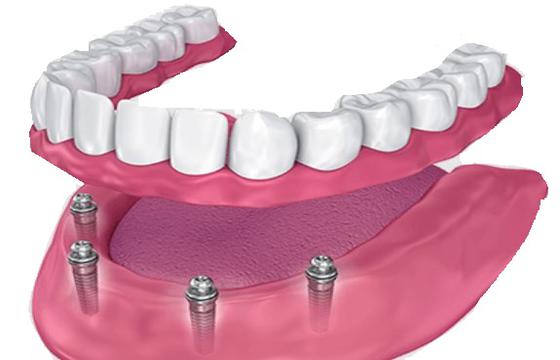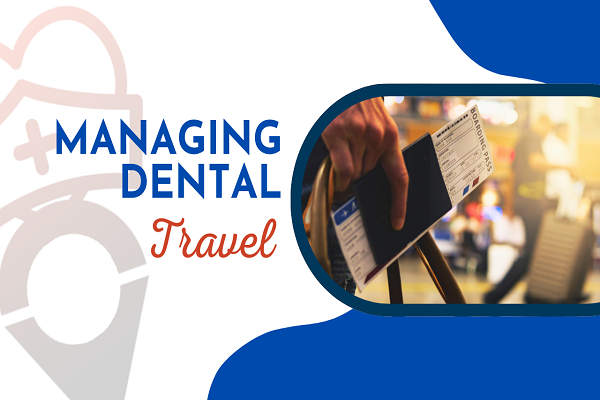
Private Nanodent Oral and Dental Health Center
- Akkuyu - Konyaaltı/Antalya
- 9 km from center
- 22 km to Airport
- Özel Nanodent Ağız Ve Diş Sağlığı Merkezi
The notion of all-on-four therapy refers to a method where patients who are toothless or soon will become so on the same day have surgery and a fixed complete jaw prosthesis restoration on 4 implants. By considering speech, self-confidence, function, aesthetics and taste, it guarantees patient pleasure. It is the primary benefit of both the procedure and overall treatment duration.

Dental treatment known as all-on-4 implants aims to replace a whole arch of teeth with just four dental implants. Patients who desire a more long-term solution than regular dentures and have lost most or all of their teeth in one or both arches are the main candidates for this method. Four dental implants are positioned strategically in the jawbone during the surgery, these implants are usually placed in the front of the mouth, where the bone is denser. When a fixed dental bridge or denture is used to replace every tooth in that arch, these implants act as anchors.
The All-on-4 implant procedure normally takes several months to complete, starting with an initial consultation during which the patient's goals for treatment and dental health are evaluated. After that, four carefully positioned dental implants will be inserted into the jawbone during a single surgical process. The implants progressively fuse with the bone over the course of the following several months, a process known as osseointegration. The final prosthetic bridge or denture is fastened to the implants when osseointegration is finished.
All-on-4 implants are made of materials that are comparable to those utilized in conventional dental implant surgeries. The following are the principal parts of All-on-4 implants,
Titanium implants, the substance used to make the implants is usually titanium, which is well-tolerated by the body and biocompatible. Through a process known as osseointegration, titanium implants fuse with the jawbone to create a sturdy and secure base for artificial teeth.
Prosthetic Teeth, a variety of materials, such as porcelain, ceramic or acrylic, can be used to create the dental bridge or prosthetic teeth that are affixed to the implants. These materials were selected because they are strong, aesthetically pleasing and can replicate the look and feel of real teeth.
Implant Abutments, the connecting elements that affix the artificial teeth to the implants are called abutments. They are frequently composed of zirconia or titanium, two other biocompatible materials renowned for their sturdiness and strength.
Framework Material (if applicable), materials like titanium or cobalt-chromium alloys may be employed when a metal framework is utilized to support the prosthetic teeth. The dental prosthesis is strengthened and stabilized by these materials.
The All-on-4 implant procedure normally consists of many steps and the length of the operation varies based on the patient's unique circumstances, including their dental health, bone density and the particular treatment plan. But a typical schedule for the All-on-4 implant procedure would resemble this:
Initial evaluation and consultation, this phase entails a thorough dental examination, which may include CT scans, X-rays and tooth and jaw imprints. Your dental health, bone density and general fitness for the All-on-4 operation will be evaluated by your dentist or oral surgeon. Usually, this first consultation requires one appointment.
Treatment planning, your dental team will create a personalized treatment plan based on the examination, taking into account your individual requirements. This might entail talking about the materials to be utilized, alternative treatment alternatives and the kind of prosthetic teeth you desire. The duration of the treatment planning stage might range from several days to several weeks, contingent upon the intricacy of the case and the accessibility of dental laboratory services.
Implant surgery, the dental implants are surgically placed following the completion of the treatment plan. In order to support the entire arch of replacement teeth, the dentist or oral surgeon will strategically put four implants in the jawbone during this surgery. In order to assure patient comfort, the procedure usually takes a few hours to complete and is frequently carried out under local anesthetic or sedation.
Healing and osseointegration, following implant placement, a healing phase is required to enable osseointegration or the fusing of the implants with the surrounding bone. The healing period usually lasts for many months, during which the prosthetic teeth's strong basis is created as the bone tissue develops and fuses with the implants.
Positioning the final prosthesis, the final prosthetic tooth or bridge can be fixed to the implants once they have completely healed and fused with the jawbone. Taking imprints and creating the tailored prosthesis are the steps involved in this phase to guarantee a perfect fit and natural appearance. Depending on each patient's unique recovery phase, the final prosthesis may be positioned many months following the first operation.
The entire All-on-4 implant procedure, from the first consultation to the final prosthetic tooth installation, might take several months.
For those who have lost most or all of their teeth in one or both arches and are looking for a more long-term alternative than typical dentures, all-on-4 implants are a good option. In the following situations, All-on-4 implants could be advised:
Severe Tooth Loss, all-on-4 implants can help patients regain their smile and oral function if they have lost a large number of teeth as a result of gum disease, decay, trauma or other conditions.
Unstable Dentures, all-on-4 implants are a more stable and long-lasting option for those who are dissatisfied with the stability, fit or functionality of removable dentures.
Bone Loss, patients who have lost jaw bone as a result of tooth loss can often benefit from all-on-4 implants. All-on-4 implants, in contrast to conventional implants, can occasionally be inserted without the requirement for bone grafting.
Desire for Permanent Solution, compared to removable dentures, some patients prefer the stability and ease of permanent dental prosthesis supported by implants. All-on-4 implants offer a reliable and durable tooth replacement option.
Increased Quality of Life, by enabling patients to consume a wider range of foods, talk clearly and smile with confidence, all-on-4 implants can dramatically increase their quality of life.
Candidates for All-on-4 implants should typically be in good general and dental health, with healthy gums and enough bone density to sustain the implants.
Significant Tooth Loss, all-on-4 implants may be helpful for those who have lost the majority of their teeth in one or both arches and are looking for a long-term tooth replacement option.
Desire for permanent Prosthesis, all-on-4 implants may be the best course of action for patients who value the stability and usefulness of permanent dental prostheses above removable dentures.
Stable Bone Structure, all-on-4 implant candidates should have enough jawbone volume and density to support the implants, even though some bone loss is normal when teeth are lost. Before implant implantation, bone grafting or other treatments could be required in situations of moderate to severe bone loss.
Bad Oral Health, until these factors are remedied, patients with untreated gum disease, ongoing infections or other oral health problems may not be good candidates for All-on-4 implants.
Uncontrolled Medical diseases, there is a higher chance of difficulties during implant surgery and integration if you have certain medical diseases, such as uncontrolled diabetes, autoimmune disorders and ailments that impact healing.
Smoking and Tobacco Use, these behaviors might hinder the healing process and raise the possibility of implant failure. It is usually recommended that patients considering All-on-4 implants give up smoking prior to receiving treatment.
Unrealistic Expectations, it is important for patients to have reasonable expectations regarding the results of All-on-4 implant therapy, taking into account the procedure's time and effort requirements as well as the limits of dental implants.
While there are a number of advantages to the All-on-4 implant procedure, there are also some hazards. An outline of the advantages and disadvantages of All-on-4 implant therapy is provided below,
Instant Function and Aesthetic Improvement, all-on-4 implants provide patients a complete set of teeth that are both functional and aesthetically beautiful, sometimes the same day as the implant procedure. Stability and Durability, Patients may smile, eat and speak with confidence thanks to the sturdy base that all-on-4 implants provide for dental prosthesis.
Jawbone Preservation, over time, implants assist to maintain face shape and prevent bone loss by stimulating the jawbone.
Better Quality of Life, by enabling patients to talk and consume a wider range of foods, All-on-4 implants can dramatically enhance their quality of life.
Minimally Invasive, all-on-4 implants require less surgery than typical implant procedures and in many situations, they do not require bone grafting.
Surgical Risks, during implant placement, there is a danger of anesthetic, infection and damage to adjacent tissues, just like with any other surgical treatment.
Implant Failure, although uncommon, implants may not adequately fuse with the jawbone, resulting in instability and the requirement for further care.
Prosthetic Complications, over time, problems like loosening, breaking or wear on the framework or prosthetic teeth may arise, necessitating replacement or repair.
Gum disease and infection, oral hygiene errors can result in peri-implantitis, a condition that resembles gum disease and can cause bone loss and inflammation surrounding implants.
Financial considerations, insurance coverage may differ and the cost of all-on-4 implant therapy might be high. Patients should think about the cost of the treatment before starting.
Depending on the objectives, goals and dental health of the patient, there are a few options to the All-on-4 implant therapy. Several typical substitutes consist of:
Conventional Dental Implants, in a traditional dental implant, a single implant is placed in the mandible to support a single crown, bridge or set of dentures. Patients with unique needs for tooth replacement or those who desire a more personalized approach could find this method more appropriate.
Overdentures Supported by Implants, overdentures supported by implants are made of removable materials that are fixed to dental implants. Implant-supported overdentures provide more stability and less chance of slippage or pain than regular dentures, which only use suction or adhesives for retention.
Dental bridges, also referred to as fixed partial dentures, are a viable option for replacing one or more lost teeth. Bridges are permanently affixed to nearby teeth or dental implants, unlike removable dentures, so they don't need to be taken out for upkeep or cleaning.
Removable Partial Dentures, for the replacement of several lost teeth, removable partial dentures offer a less intrusive and more economical solution. Artificial teeth are affixed to a base that is gum-colored and held in place by clasps or other retention devices fastened to neighboring real teeth in these gadgets.
The patient's dental health, habits, maintenance schedule and the caliber of the materials utilized are some of the variables that might affect how long All-on-4 implants last. All-on-4 implants, on the other hand, are intended to be a durable tooth replacement option.
For certain individuals, All-on-4 implants may last a lifetime if they are properly maintained and cared for. The following elements support All-on-4 implants' long-term success,
Osseointegration, the stability and durability of All-on-4 implants depend on the implants' integration with the jawbone, called osseointegration. In order to ensure effective osseointegration, patients must adhere to post-operative care recommendations, which usually take many months to complete.
Good Oral Hygiene, to preserve the health of the implants and surrounding tissues, good oral hygiene practices including brushing, flossing and routine dental examinations are crucial. Individuals who have All-on-4 implants should practice good dental hygiene to avoid peri-implantitis and gum disease, which can weaken the durability of the implants.
Frequent Dental Maintenance, to keep an eye on the condition of the implants and identify any possible problems early on, regular dental checkups and expert cleanings are required. To maintain ideal performance and appearance, your dentist could suggest routine maintenance or repairs for the artificial teeth.
Steer Clear of Dangerous Habits, smoking, bruxism and biting on hard objects are a few habits that might raise your chance of implant failure or damage to your prosthetic teeth. In order to preserve the lifespan of their dental restorations, patients with All-on-4 implants should refrain from following behaviors.
Material Quality, the lifetime of implants and prosthetic teeth can also be affected by the quality of the materials used in their construction. The stability and longevity of All-on-4 implants depend on the use of premium titanium implants and long-lasting prosthetic materials.



*The treatment pages provided on this platform are intended for informational purposes only and do not constitute medical or dental advice, diagnosis, or treatment recommendations. The information presented on these pages is not a substitute for professional medical or dental advice from qualified healthcare providers.
*By accessing and using the treatment pages on this platform, you acknowledge and agree to the terms of this disclaimer. If you do not agree with these terms, please refrain from using the treatment pages.